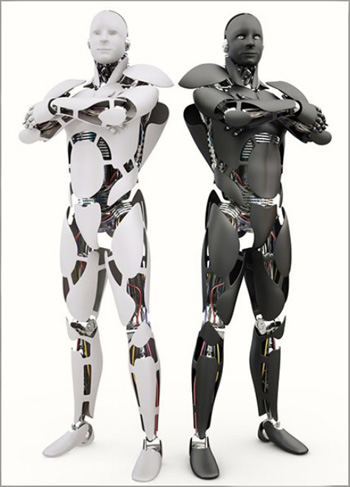Transhumanism & Artificial Intelligence
 |
 |
 |
 |
 |
 |
 |
Milley: U.S. Military Will Become Robotic
According to retired Army Gen. Mark Milley, robots and other advanced machinery
could make up a third of the U.S. military by the year 2039.
The former chairman of the Department of Defense‘s Joint Chiefs of Staff made this prediction during the launch of Axios‘ Future of Defense Newsletter. During his speech at the July 11 event, he highlighted the potential for artificial intelligence (AI) and unmanned technology to lead to the creation of robotic military forces.
“Ten to 15 years from now, my guess is a third – maybe 25 percent to a third – of the U.S. military will be robotic,” Milley said, adding that these robots could be commanded and controlled by AI systems. According to the retired general, advancements in technology and changes in the nature of war will enable militaries worldwide to make smarter and faster decisions.
 He distinguished between the fundamental aspects of war, which involve human actions and political motives, and the character of war, which encompasses tactics, technologies, weapons systems and leadership training. While the nature of war remains consistent, Milley pointed out that the character of war is undergoing a significant transformation due to
the rise of AI and robotics. He compared this shift to the historical transition from muskets to rifles during the Civil War, a change that had a lasting impact on military tactics.
He distinguished between the fundamental aspects of war, which involve human actions and political motives, and the character of war, which encompasses tactics, technologies, weapons systems and leadership training. While the nature of war remains consistent, Milley pointed out that the character of war is undergoing a significant transformation due to
the rise of AI and robotics. He compared this shift to the historical transition from muskets to rifles during the Civil War, a change that had a lasting impact on military tactics.
The retired general asserted that the nation that most quickly integrates these technologies into its military will gain a substantial advantage over its rivals. To retain its position as the world’s most formidable military force, he stressed that the U.S. must rapidly adapt and potentially revolutionize its operations.
According to Milley, current U.S. policy mandates human oversight in the use of military robots, particularly regarding lethal force due to humans’ capacity of ethical decision-making – a trait that technology lacks. He nevertheless did not dismiss the possibility of a future where AI-enabled machines could make autonomous decisions, posing the question of whether this is a desirable direction for the world.
Other militaries also seeing the potential of robo-soldiers
During the event, Milley noted that the number of human troops in militaries “will probably be reduced as [nations] move toward robotic systems.” He continued: “It will be a fundamental change, and I would argue that other nations’ militaries are going to be similarly designed.” (Related: So they’re experimenting with military robots in Gaza now.)
“The country that optimizes those technologies for military use is going to have a very significant – and potentially decisive – advantage in an armed conflict.”
 Axios reported that militaries have, for years, tinkered with robot units to bolster their fighting capacity. Such technologies include armed drones, robo-dogs, mechanical mules and more. Even the U.S. military’s various branches are looking into the prospect of using these robotic technologies, with Axios sharing several examples.
Axios reported that militaries have, for years, tinkered with robot units to bolster their fighting capacity. Such technologies include armed drones, robo-dogs, mechanical mules and more. Even the U.S. military’s various branches are looking into the prospect of using these robotic technologies, with Axios sharing several examples.
“The Army is experimenting with what’s known as human-machine integrated formations, where soldiers fight alongside automatons. The Air Force is seeking so-called ‘collaborative combat’ aircraft that can fly alongside human pilots to collect intelligence, confuse enemy electronics and even blow up targets.”
“The Navy is in pursuit of a hybrid fleet, with unmanned surface and underwater vehicles augmenting the firepower of sailors and Marines. One pioneer is Task Force 59 in the Middle East.”
But Thailand-based journalist Ben Bartee sarcastically noted the “advantages” of robot soldiers over human troops.
“Of course, robot soldiers don’t ask questions. They don’t have moral qualms. They don’t require lifelong healthcare from the [Department of Veterans Affairs] for [post-traumatic stress disorder], hazard pay or compensation when their robot limbs get blown off.”
“They don’t have the capacity to say no to unconstitutional orders. Indeed, they have no inherent allegiance to the Constitution whatsoever, only to the interest they would be programmed to serve by whoever programmed them.”
This article was first published in
Future Tech News on July 30, 2024, under the title “Mark Milley: ROBOTS could make up a third of the U.S. military by 2039”
Read more articles by OLivia Cook here

The former chairman of the Department of Defense‘s Joint Chiefs of Staff made this prediction during the launch of Axios‘ Future of Defense Newsletter. During his speech at the July 11 event, he highlighted the potential for artificial intelligence (AI) and unmanned technology to lead to the creation of robotic military forces.
“Ten to 15 years from now, my guess is a third – maybe 25 percent to a third – of the U.S. military will be robotic,” Milley said, adding that these robots could be commanded and controlled by AI systems. According to the retired general, advancements in technology and changes in the nature of war will enable militaries worldwide to make smarter and faster decisions.

Gen. Milley speaks to 60 Minutes
The retired general asserted that the nation that most quickly integrates these technologies into its military will gain a substantial advantage over its rivals. To retain its position as the world’s most formidable military force, he stressed that the U.S. must rapidly adapt and potentially revolutionize its operations.
According to Milley, current U.S. policy mandates human oversight in the use of military robots, particularly regarding lethal force due to humans’ capacity of ethical decision-making – a trait that technology lacks. He nevertheless did not dismiss the possibility of a future where AI-enabled machines could make autonomous decisions, posing the question of whether this is a desirable direction for the world.
Other militaries also seeing the potential of robo-soldiers
During the event, Milley noted that the number of human troops in militaries “will probably be reduced as [nations] move toward robotic systems.” He continued: “It will be a fundamental change, and I would argue that other nations’ militaries are going to be similarly designed.” (Related: So they’re experimenting with military robots in Gaza now.)
“The country that optimizes those technologies for military use is going to have a very significant – and potentially decisive – advantage in an armed conflict.”

By 2039 one third of the military will be robot-soldiers
“The Army is experimenting with what’s known as human-machine integrated formations, where soldiers fight alongside automatons. The Air Force is seeking so-called ‘collaborative combat’ aircraft that can fly alongside human pilots to collect intelligence, confuse enemy electronics and even blow up targets.”
“The Navy is in pursuit of a hybrid fleet, with unmanned surface and underwater vehicles augmenting the firepower of sailors and Marines. One pioneer is Task Force 59 in the Middle East.”
But Thailand-based journalist Ben Bartee sarcastically noted the “advantages” of robot soldiers over human troops.
“Of course, robot soldiers don’t ask questions. They don’t have moral qualms. They don’t require lifelong healthcare from the [Department of Veterans Affairs] for [post-traumatic stress disorder], hazard pay or compensation when their robot limbs get blown off.”
“They don’t have the capacity to say no to unconstitutional orders. Indeed, they have no inherent allegiance to the Constitution whatsoever, only to the interest they would be programmed to serve by whoever programmed them.”
Read more articles by OLivia Cook here

Posted August 7, 2024
______________________
______________________
 Volume I |
 Volume II |
 Volume III |
 Volume IV |
 Volume V |
 Volume VI |
 Volume VII |
 Volume VIII |
 Volume IX |
 Volume X |
 Volume XI |
 Special Edition |


